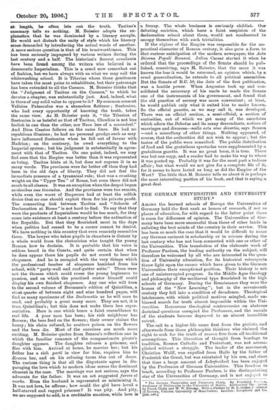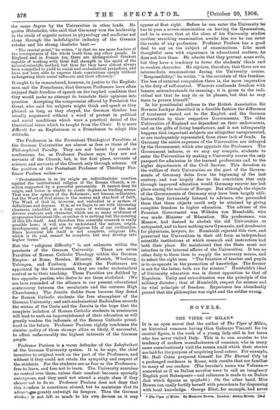THE GERMAN UNIVERSITIES AND UNIVERSITY STUDY.* AMONG the learned schools
of Europe the Universities of Germany hold the first rank as homes of research, if not as places of education, for with regard to the latter point there is room for difference of opinion. The Universities of Ger- many have been more successful than those of other lands in enlisting the best minds of the country in their service. This has been so much the case that it would be difficult to name any German eminent in scholarship or in science during the last century who has not been connected with one or other of the Universities. This translation of the elaborate work of Professor Paulsen, the leading authority on the subject, will therefore be welcomed by all who are interested in the ques- tion of University education, for its historical retrospects throw light upon the causes which have given to the German Universities their exceptional position. Their history is not one of uninterrupted progress. In the Middle Ages theology and philosophy of the mediaeval type flourished in the high schools of Germany. During the Renaissance they were the homes of the "New Learning"; but in the seventeenth century they fell into a condition of decadence. Theological intolerance, with which political motives mingled, made un., biassed search for truth almost impossible within the Uni, versifies. Rancorous theological controversies on abstruse doctrinal questions occupied the Professors, and the morals of the students became depraved to an almost incredible extent.
The call to a higher life came first from the pietist% and afterwards from those philosophic thinkers who claimed the right to seek for the truth of reason free from all traditional assumptions. This liberation of thought from bondage to tradition, Roman Catholic and Protestant, was not accom- plished without a struggle. The leader of the movement; Christian Wolff, was expelled from Halle by the father of Frederick the Great, but was reinstated by his son, and since that time a large amount of Lehrfreiheit has been enjoyed by the Professors of German Universities. This freedom to teach, according to Professor Paulsen, is the distinguishing star of the Universities of Germany, and is not enjoyed to
* The Gsrnian 11nitisrsitfcs and University Study. By Friedrich P.i.Oven., Professor of Philosophy in the University of Berlin. Authorized Trio. lation by Frank Thilly and W. W. Elwrusg. With a Preface by M. E. Sadler, F _ofessor of History, Victoria University of Blanchester. London Longmans tnd Co. (1.5e. net.1 the same degree by the Universities in other lands. He quotes Helmholtz, who said that Germany won the leadership in the study of organic nature in physiology and medicine not alone through the indefatigable industry of the German scholar and his strong idealistic bent :— " The crucial point," he writes, "is that we are more fearless of the consequences of the whole truth than any other people. In England and in France too, there are distinguished thinkers capable of working with their full strength in the spirit of the natural-scientific method, but thus far they have almost always been compelled to yield to social and ecclesiastical prejudices. and have not been able to express their convictions openly without endangering their social influence and their efficiency."
It ought to be remembered, however, in justice to the English- man and the Frenchman, that German Professors have often
enjoyed their freedom of speech on the implied condition that they would make no attempt to translate their opinions into practice. Accepting the compromise offered by Frederick the Great, who said his subjects might think and speak as they pleased as long as they obeyed, the German thinker has usually acquiesced without a word of protest in political and social conditions which were a practical denial of the theoretical views which be taught from the Chair. It is more difficult for an Englishman or a Frenchman to adopt this attitude.
The Professors in the Protestant Theological Faculties at the German Universities are almost as free as those of the Philosophical Faculty. They are not bound by creeds or confessions, for, as Professor Paulsen says, they are not servants of the Church, but, in the first place, servants of science, and servants of the Church only through science. Of the position of the Protestant Professor of Theology Pro- fessor Paulsen writes :—
" Protestantism is in its origin an individualistic reaction against the institutional religion of the Roman Church, a re- action supported by a powerful personality. It cannot deny its origin, and hence is unable to create dogmas as binding norms. That was the opinion of the Reformers; not human ordinances, but the Word of God alone, is the source and standard of faith. The Word of God is, however, not embodied in a system of definitions and dogmas. It is, as we begin to see with increasing clearness, imbedded in a long series of writings of the most diverse contents and character, which are so many evidences of progressive historical life; or rather it is nothing but the meaning of this life itself. And therefore free scientific research is really possible here ; it will aim to understand the nature, origin, developments, and goal of the religious life of our civilization. Since historical life itself is not complete, religious life, which is its soul, cannot be complete, but may develop into higher forms."
But the "religious difficulty" is not unknown within the precincts of the German University. There are seven
Faculties of Roman Catholic Theology within the German Empire : at Bonn, Breslau, Minster, Munich, Wiirzburg, Tubingen, and Freiburg. Although the Professors are appointed by the Government, they are under ecclesiastical control as to their teaching. These Faculties are disliked by two opposite parties, who desire to see them abolished. (We are here reminded of the alliance in our present educational controversy between the secularists and the extreme High Churchmen.) The Jesuits dislike them because they dread for Roman Catholic students the free atmosphere of the German University; and anti-ecclesiastical Radicalism seconds the wishes of the Curia and the Jesuits in the hope that the complete isolation of Roman Catholic students in seminaries will lead to such an impoverishment of their education as will greatly weaken the influence of the Roman Catholic priest- hood in the future. Professor Paulsen rightly condemns the sinister policy of those strange allies as likely, if successful, to affect unfavourably the highest interests of the German people.
Professor Paulsen is a warm defender of the Lehrfreiheit of the German University system. It is, he says, the chief incentive to original work on the part of the Professors, and without it they could not retain the sympathy and respect of
the students. For the students are as free as the Professors : free to learn, and free not to learn. The University exercises no control over them, unless their conduct becomes specially outrageous, and they need not attend a single class if they choose not to do so. Professor Paulsen does not deny that this freedom is sometimes abused, but he maintains that its
advan wee greatly outweigh its dangers. Then the German studei..; is not left so much to his own devices as it may appear at first sight. Before he can enter the University he has to pass a severe examination on leaving the Gymnasium, and he is aware that at the close of his University studies another searching examination awaits him ere he can enter the ranks of any profession. Professor Paulsen has a good deal to say on the subject of examinations. Like most thoughtful men with experience in educational matters, he does not love them. He admits that they prevent some evils, but they have a tendency to lower the students' ideals and to weaken character. He rejoices, therefore, that there are no intermediate examinations during the University course. "Responsibility," he writes, "is the correlate of this freedom. The less of external compulsion there is, the more imperative is the duty of self-control. Whoever confounds freedom with licence, misunderstands its meaning ; it is given to the indi- vidual not that he may do as he pleases, but that he may learn to govern himself."
In his presidential address to the British Association Sir Norman Lockyer described in a forcible fashion the difference of treatment meted out to the English and the German Universities by their respective Governments. The older Universities of England are dependent on their endowments, and on the gifts of living benefactors, and it not infrequently happens that important subjects are altogether unrepresented, or are inadequately represented, from sheer lack of funds. In Germany the entire expenses of the Universities are defrayed by the Government, which also appoints the Professors. The Government induces, or we may say compels, students to enter the Universities by making a University course the only passport for admission to the learned professions and to the higher departments of the Civil Service. This devotion to the welfare of their Universities on the part of the Govern- ments of Germany dates from the _beginning of the last century, and was largely due to the conviction that only through improved education would Germany recover her lost place among the nations of Europe. But although the objects of the Governments of Germany may have been largely utili- tarian, they fortunately listened to advisers, who persuaded them that these objects could only be attained by giving complete freedom to higher education. The adviser of the Prussian Government was Wilhelm von Humboldt, who was made Minister of Education. His predecessor, von Massow, had desired to abolish the old Universities as antiquated, and to have nothing save Gymnasia, and Academies for physicians, lawyers, &c. Humboldt rejected this view, and preserved the Universities in their old form as independent scientific institutions at which research and instruction had both their place. He maintained that the State must not interfere in the internal affairs of the Universities. It has no other duty to them than to supply the necessary means, and to select the right men. "The function of teacher and pupils is to co-operate in the promotion of knowledge. The former is not for the latter, both are for science." Humboldt's ideal of University education was in direct opposition to that of Napoleon. Unity and subordination was the principle of the military dictator ; that of Humboldt, respect for science and its vital principle of freedom. Experience has abundantly proved that the philosopher was right and the soldier wrong.















































 Previous page
Previous page